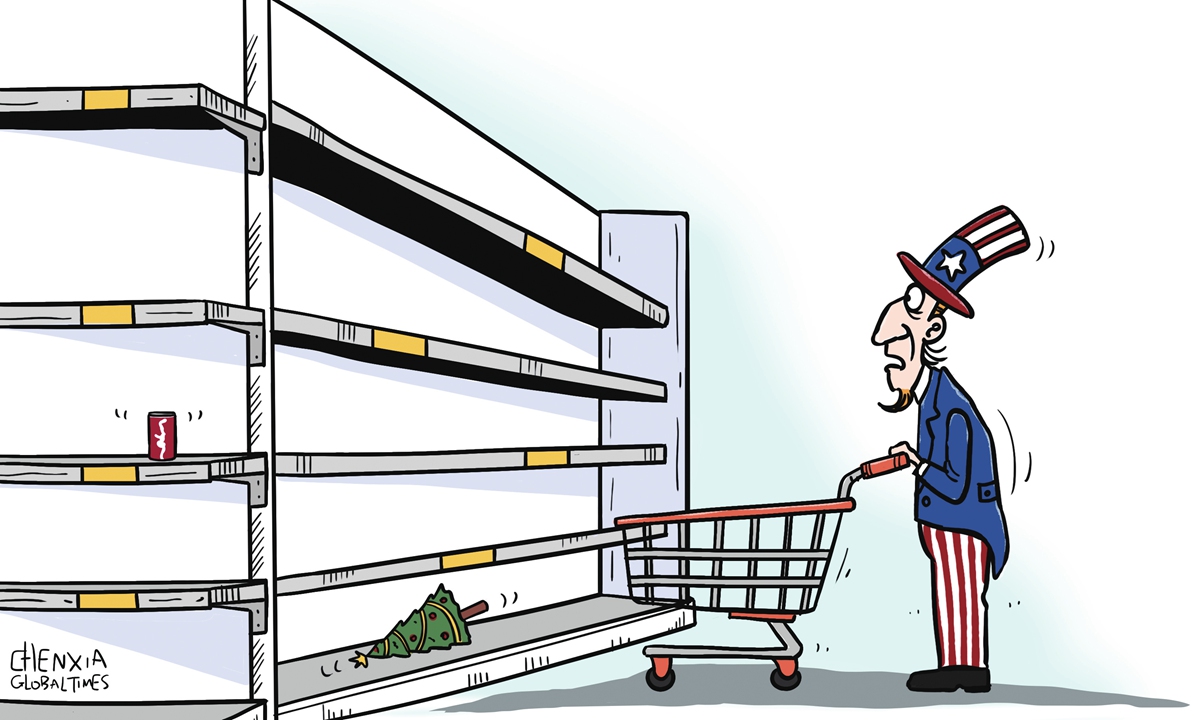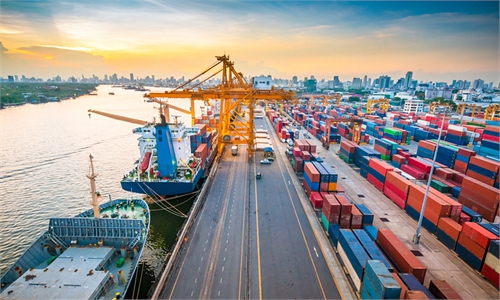
Empty shelves in the US Illustration: Chen Xia/GT
Many social problems, which are supposed to take place only in developing countries, are occurring in the US, the No.1 power in the world. Having empty shelves in grocery stores is one of such problems.
Photos and videos on social media show empty shelves across the US amid growing evidence of shortages of food and daily necessities, such as toilet papers. "I've never seen empty shelves like this in my lifetime," one person tweeted with a picture of rows of cleared-out shelves. The hashtag #EmptyShelvesJoe once shot to the top of the trending topics on Twitter to rip US President Joe Biden for the supply chain crisis and skyrocketing prices.
Reports and opinions in the US media attributed the problem to the supply chain crisis. But there is seldom any mention or realization that behind the crisis is the inability of the US to deal with it. In fact, the US ability to deal with a crisis makes it like a developing country.
Stunning crises
From a short-term perspective, the decline of the US ability to cope with crises and the change of the global perceptions of the US started with the COVID-19 pandemic. The fact that the US, despite having the world's best medical resources, has allowed the largest numbers of deaths and infections to take place is the very manifestation of the US inability in face of a public health crisis. Some scholars even debate about whether the US' response to the pandemic has gotten the country into the rank of "failed states."
And what if there is an energy crisis? In February this year, the US state of Texas suffered a major electricity shortage as a result of three severe winter storms, which led to outage of water, food and heat. State officials said the failure caused 151 deaths, while experts found the true number could be more than 700. The state's lack of preparedness of such natural disasters drew much attention.
Then there was the Miami condo collapse in June this year. It led to the death of 98 people and the injuries of dozens. The rescue operations took almost two weeks and the "golden 72 hours" right after the collapse was not fully made use of. The collapse of buildings is believed to only happen in backward countries; what's worse, the US' rescue capability in emergency situations was much lower than people's expectations.
These are enough to put the world in awe and to convince people of the US inability to cope with crises. All point to the fact that the US has few tools when a social crisis occurs. Repeated crises have shown that the US government is rarely prepared for the worst scenarios. Nor does it have the required flexibility to respond when crises hit.
People discussed and complained about a crisis. Yet eventually its social impact faded as if it had seemingly never happened. This leaves the impression that structural changes are not needed in the US society. However, it only makes the US see one crisis after another. The current supply chain crisis will not be the last.
Not a can-do country anymore
Indeed, empty shelves are something fresh to the Americans. And the response of the Americans so far is to mock their president and wonder if they can still spend a marvelous Christmas as they did before without giving and receiving gifts. Even in the minds of the Americans, this is something that shouldn't have taken place in their country, as it is believed to be a natural scene in a developing country.
In the 2000s, the US media extensively covered the empty shelves in Zimbabwe, a country on which the US has imposed many illegal sanctions. A Washington Post report in 2014 even said that Venezuela's supermarkets didn't have enough food or toilet paper. It asked, "Why can't an oil-rich country even keep its stores stocked?"
It invites the same question seven years later. People from all over the world are in a position to ask, "Why can't the world's sole superpower even keep its stores stocked?"
The US used to view the world with a superior mentality. It had the reputation of being problem solvers and par excellence. It became known as the can-do country. US media coverage is full of stereotypes and generalizations about developing countries, as if all the problems of developing countries should be attributed to the fact that they have a system different from that of the US and that the US democratic system is the only once-and-for-all solution. But when all the problems that are supposed to take place in developing countries take place in the US, why hasn't its democratic system functioned well for itself?
The US should get used to how the world actually sees it. The way the US looked at the other countries is the way the others now look at the US.
Hollywood movies often cast US messianic heroes saving the globe. This comes out of the American pride the country once rested on. But gradually, the world may take it as natural when various US crises are reported out of the US. The US is not saving the world. It is the opposite: The US makes the world share its burdens and it needs to learn the experience of other countries to tackle its own woes.
The US is now the can't-do country. It is no longer the "city upon a hill" that enjoys exceptionalism and privileges. Perhaps only narcissistic Americans believe so.
The author is an editor with the Global Times. wangwenwen@globaltimes.com.cn


